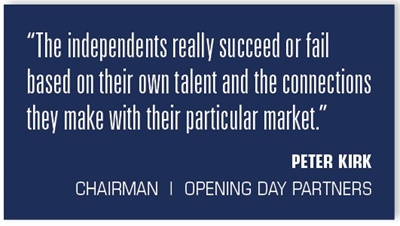Like their affiliated counterparts, minor league baseball’s independent leagues are experiencing a historic rise in franchise values. But the financial landscape is much more specific to individual clubs and markets.
The most lucrative sale of an independent minor league team is believed to be the Atlantic League’s Long Island Ducks, when former Deutsche Bank Chief Executive Seth Waugh acquired a controlling interest in the club in 2011 in a deal valuing the franchise at $24 million.
Several other independent team sales have reached eight figures, and executives from the nonaffiliated leagues said thriving franchises such as the Sugar Land Skeeters in suburban Houston, also of the Atlantic League, would fetch a price very similar to the recent $40 million Dayton Dragons sale if they were for sale.
Without the baseline of a defined MLB team affiliation and market territory, though, independent league teams are more closely scrutinized on their own actual, year-to-year financial performance.
“The value of independent clubs, I believe, is much more realistic and tied to the bottom line,” said Miles Wolff, commissioner of both the Can-Am League and the American Association. “If you wanted one of the top independent franchises — a St. Paul, a Sugar Land, something like that — you would definitely pay a lot. Others, at the other end of the spectrum, you still might get for less than $1 million. But independent baseball is not limited by scarcity, a defined number of franchises, so it’s a different situation.”
Indeed, the growth of independent leagues such as the Atlantic League and American Association over the past decade has been a rather targeted progression in which markets, facilities and ownership groups were carefully chosen to promote individual financial success since there is no assistance from an MLB parent club. As a result, owners who have experience in both affiliated and independent clubs say it is the independents that more routinely turn a profit.
“The independents really succeed or fail based on their own talent and the connections they make with their particular market,” said Peter Kirk, chairman of Opening Day Partners. The firm owns several Atlantic League teams, including the Skeeters, and previously was involved in several affiliated clubs. “That’s different from a situation like, say, Harrisburg. That franchise sold for more than $13 million [in 2007], which was a league record at the time, and it had never made a penny.”
As major league team valuations continue to soar, and in turn price out many high net-worth individuals and shift them toward the minor leagues, Kirk said he expects to soon see independent league values move into the $30 million to $50 million range. The Atlantic League is aiming to soon expand from its current eight teams to 12 and in the coming months will set the expansion fees for those additional franchises.
Those fees present a bit of a dilemma for the Atlantic League, though. The league’s expansion fee, historically $3 million and termed a “membership fee,” is no longer reflective of current market conditions. A higher fee would help set a new floor in valuations for the existing team owners but also could hamper the financial viability for the startup teams that in most instances must also take on a multimillion-dollar commitment for a ballpark.
Kirk said he expects the league to take a conservative tack in setting the new fee.
While independent teams have enjoyed greater latitude to operate as they see fit, they also must pay their own players and coaches and supply their own equipment — unlike affiliated teams, where those costs are covered by the major league parent club. And the independent leagues do not enjoy the revenue enhancement of Minor League Baseball collective ventures such as the BIRCO online initiative or the Project Brand sponsorship effort. Because of that, some prominent sports bankers have not elected to get involved in independent league team sales.
“We’ve sort of made a judgment that it’s been better for us to stay on the affiliated side,” said Bob Caporale, chairman of Game Plan and the banker for the recent Dayton Dragons sale by Mandalay Baseball Properties. “With the affiliated clubs, the baseball side is basically covered by the parent club, so the operators can really just focus on the business. It’s easy to get distracted in this business by the team operations, which we see a lot in the major leagues, so the affiliated minors have an enviable situation where they’re not responsible for the labor costs.”




